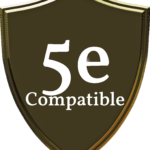Ancestries

Ancestral Traits
The description of each ancestry includes ancestral traits that are common to members of that ancestry. The following entries appear among the traits of most ancestries.
Ability Score Increase
Every ancestry increases one or more of a character’s ability scores.
Age
The age entry notes the age when a member of the ancestry is considered an adult, as well as the ancestry’s expected lifespan. This information can help you decide how old your character is at the start of the game. You can choose any age for your character, which could provide an explanation for some of your ability scores. For example, if you play a young or very old character, your age could explain a particularly low Strength or Constitution score, while advanced age could account for a high Intelligence or Wisdom.
Alignment
Most ancestries have tendencies toward certain alignments, described in this entry. These are not binding for player characters, but considering why your dwarf is chaotic, for example, in defiance of lawful dwarf society can help you better define your character.
Size
Characters of most ancestries are Medium, a size category including creatures that are roughly 4 to 8 feet tall. Members of a few ancestries are Small (between 2 and 4 feet tall), which means that certain rules of the game affect them differently. The most important of these rules is that Small characters have trouble wielding heavy weapons, as explained in “Equipment.”
Speed
Your speed determines how far you can move when traveling (“Adventuring”) and fighting (“Combat”).
Languages
By virtue of your ancestry, your character can speak, read, and write certain languages.
Lineages
Some ancestries have lineages. Members of a lineage have the traits of the parent ancestry in addition to the traits specified for their lineage. Relationships among lineages vary significantly from ancestry to ancestry and world to world.